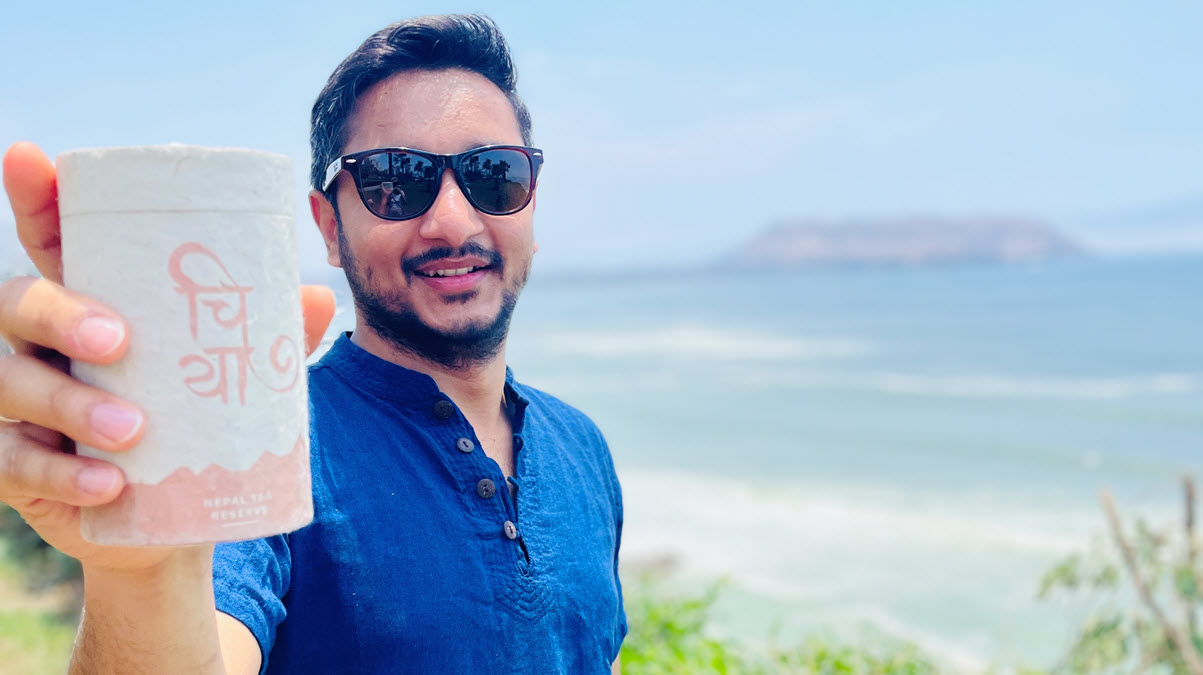“We changed one word in our charter to include every farmer supplying even a kilo of leaf to us. We decided that as a Public Benefit Corporation we are not only responsible for creating value for company shareholders but will also create value for all stakeholders. One percent of our top-line revenue goes directly to the farmers.” ??? Nishchal Banskota
Listen to the Interview
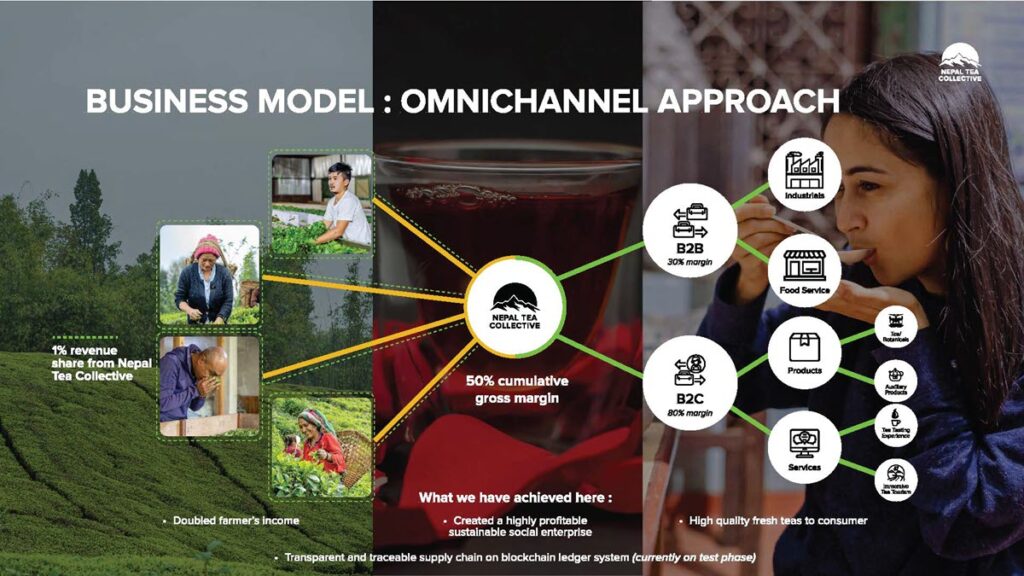
QR Codes Make Tea Easily Traceable by Consumers
In 2015 after graduating college in the US, Nischal, who grew up near Ilam farming Nepal’s first certified organic tea garden, returned to open the BG Tea Bar, the first tea bar in Kathmandu. A year later, following a devastating 7.8 magnitude earthquake, he launched Nepal Tea, which has since grown in sales and reputation. Banskota says that he is committed to creating tech-enabled, transparently traded tea. His venture produces award-winning Himalayan teas, sustainably sourced and packaged, bringing jobs to the tea lands that pay double the prevailing wage. Teas are shipped directly to customers worldwide. Every hand-made package is labeled with a QR code that enables buyers to meet the growers at one of three farms. The omnichannel business earns high gross margins selling wholesale and packaged tea. One percent of revenue is reinvested in farming communities, and a tea sapling is planted for every order (10,000 in 2022). Banskota is currently seeking investors on WeFunder with a goal of $600,000. The money will be used to extend the brand to include organic botanicals, make the company’s supply chain more sustainable and construct infrastructure for visiting tea tourists. A three-year goal is to build a modern packaging and fulfillment center in Nepal. The campaign is nearing $200,000. The minimum investment is $250.

In January 2022 we decided a crucial step towards our bigger mission in the tea industry was to covert our company to a public benefit corporation.
Day one, when I started the company, it was much more than a money-making business it was a lot more about impact and how we can really help the producers, the farmers who are almost invisible to the consumers.
My personal goal is to get 1 million farmers out of poverty within their generation and within my lifetime. So, I’m 30 now, and hopefully have enough years in my life to be able to get to that number.
In the new charter we said we’re not only going to be responsible for creating value for the shareholders, we will also look forward to creating value for all stakeholders. So, we literally changed one word to include every single farmer supplying even a kilo of leaf to us. We then took our mission one step further, to put it into actionable terms so 1% of our top line revenue is directly going to the farmers themselves.
I know; it’s a very small amount but that gesture will help all the people who supply teas to us to understand that they are not just suppliers, they’re partners in the business. The more we sell, the more we more they get. And the more they get, the more they are going to invest in creating better products. So we’re going to buy it at a better price and sell even more tea. At the end of the day, it establishes a cycle where they create value for us, and we create value for them. This leads to really sustainable relationships with the producers and consumers.
We want to set the standard high and be accountable. Every single year, we’re going to publish on our website what we did, how we did it, and exactly what that impact was. So everything is going to be completely transparent, and traceable. We are making our lives difficult, in a way. We are doing all of this because we believe the tea industry has not been too fair to the producers and the farmers. And we want to change that.
Dan: Nishchal, you were born in Nepal, and you’ve lived and worked on a tea farm for much of your life. Will you tell our listeners why Nepal is such a great place to grow tea?
Nishchal: Nepal itself is the country of the Himalayas. The geography where the tea grows has a microclimate that is absolutely suitable for the production of high-quality teas. The winds blow down from the mountains and moist air from the Bay of Bengal creates a very volatile environment in which the tea plants really thrive. The variations in temperature make Nepal a very nice environment for the tea plants to generate rich flavors, and it’s not just that the tea plants are much younger, which also helps to create the distinct flavors for the teas that are grown in Nepal.
One of the most interesting things that I have found is the passion of the tea maker — and the tea makers are young. When you think about tea makers, you think about years and decades of experience and all of that but one thing which is quite different in Nepal is that the tea makers are super young. In fact, the tea maker at our family farm is 22 years old. He’s one of the youngest tea makers in Nepal, and is not at all hesitant to experiment with what can be done to these leaves.
They’re experimenting with a lot of different types of leaves, a testament to their commitment to quality are the awards these teas has been winning in many parts of the world. In fact, just yesterday, six of our teas, which were all made by these young tea makers won awards in the 5th AVPA Teas of the World contest. So there were six awards that were won by our geography.
All in all the climate and pristine environment is ideal for the production of tea. These tea farmers all busy taking care of these tea bushes, just as they would their child. It is the young tea makers who are experimenting with the best way to create high quality teas aided by the fact that in Nepal the organic way of cultivation has been in place for many years.
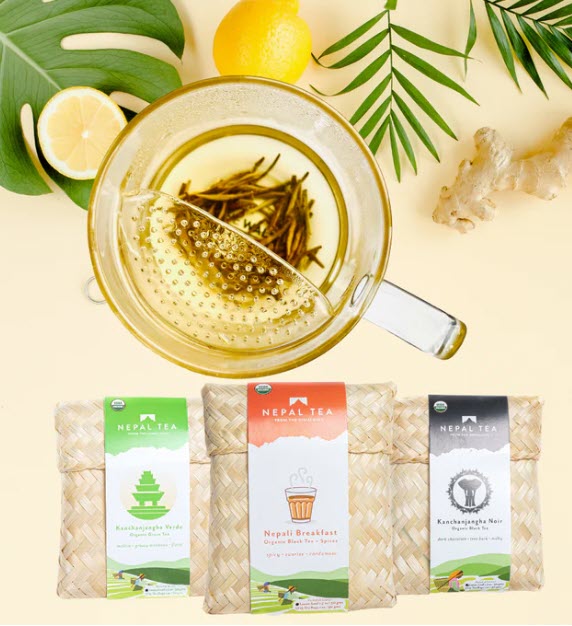
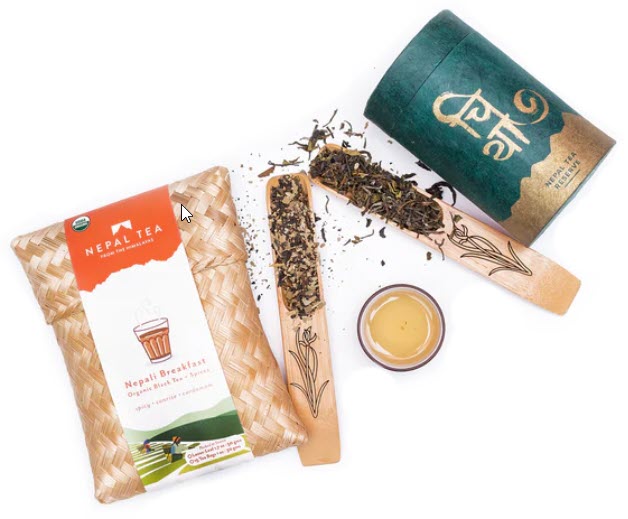
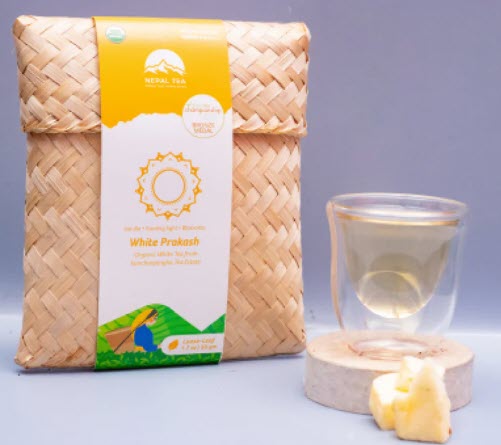
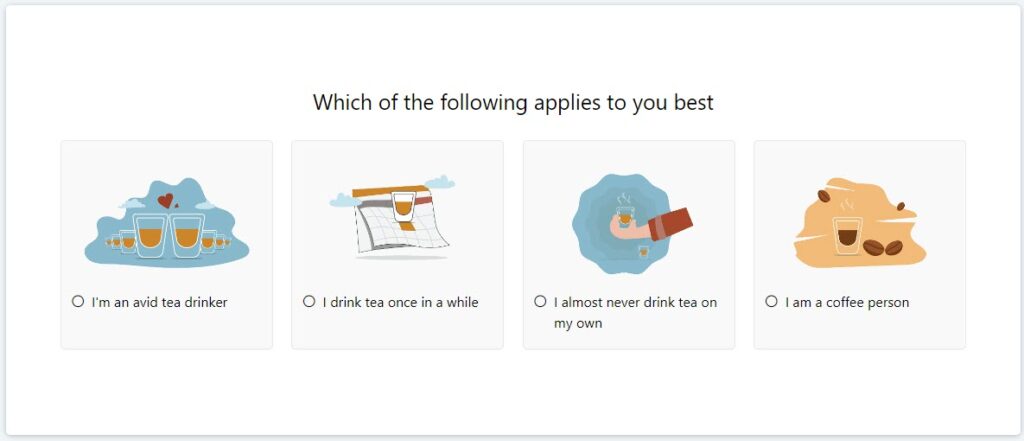
Dan: To realize your vision will take additional resources from outside investors, and ultimately, it will take an organization that is more capable of delivering results at scale, far more so than during the initial startup phase. You’ve done remarkable work over the last six years. Describe why it makes sense to bring additional investors on board. Will you also explain the funding mechanism so that others can help you to realize your vision?
Nishchal: When my father started the first organic tea garden in Nepal, it was unheard of to use backyard kitchen gardens to grow commercial crops but slowly, slowly, a lot of people picked it up. Today, a combination of cash crops and food for the family are thought of as the ideal model, one that has completely transformed the community.
I want to replicate that model as it is favorable for the whole country of smallholder farmers. It is will take a lot of investment, a lot of expertise, and a lot of young energy, to fulfill the dream of the collective.
One of the easiest ways we have found to bring consumers together is to introduce consumers to the producers. What we have done is to connect consumers all around the world, inviting them to become investors to advance our dream.
The Nepal Tea Collective is opening investments in the company worldwide. We chose an equity crowdfunding model to raise funds. To learn more visit WeFunder.com/nepalteacollective. Individuals can invest as little as $250.
Our goal is to construct a fulfillment center in the southern part of the country, and be able to collect many different teas from many different geographies, on the hilly areas, and plateaus. The fulfillment center and warehouse will consolidate tea from many growers, store it properly, package it and generate employment and attract foreign revenue for the country. Modern fulfillment will enable growers to leverage the logistics through Amazon and Shopify to sell globally and create an identity for Nepal and Nepali teas
I envision anybody living anywhere in the world can just go to our website and be able to order keys directly from the source and know where that is coming from, when was it plucked, and how it was made, who are the people behind these teas, and all of that kind of stuff.
We want tea companies, we want tea lovers, we want anybody who drinks tea to become a part of this.
We are already starting talks with people who want to see the impact on the ground. So, impact funds or non-governmental agencies, when all of us come together that’s when the beauty begins and really creates value for not just the tea industry. This would be a model for all the agricultural products coming out of the country.
We’re setting stringent ambitions. We’re looking for at least 80% of our ingredient volume to meet regenerative organic standards by 2029. The remaining 20% are things like citric acid that aren’t necessarily covered by those standards at this time.
Finally, and most importantly, we are working with our sustainability consulting firm, Pure Strategies, to measure this progress step by step. And we will be keeping our community updated on milestones, through our website and through our social pages.
So, we know we owe those answers to our consumers.
Download an Investors Pitch Deck
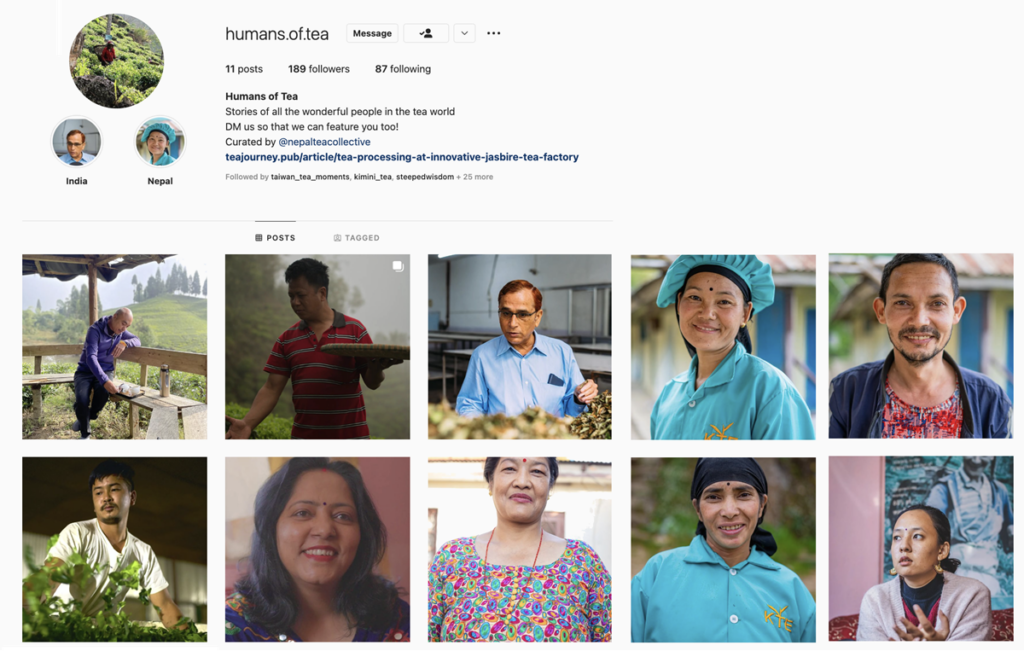
Curated by @nepalteacollective
Humans of Tea
Nishchal Banskota recently started a humans.of.tea page on Instagram to shed light on the people in tea, especially the farmers. “We bring their stories to bring to light. Please do send us a message if you’d like to get featured,” he says.
Link to share this post with your colleagues
Signup and receive Tea Biz weekly in your inbox.
